A couple of years ago Fr João Vergamota, a Portuguese priest studying for his Licentiate in Canon Law, chose to write his thesis on the provisions of the Apostolic Constitution Anglicanorum Coetibus, the legal provision for the establishment of the Personal Ordinariates. Fr Vergamota, who is the parish priest of Encarnação, Lisbon, is now a Priest Affiliate of the Personal Ordinariate of Our Lady of Walsingham and part of our Ordinariate Expats group of members and friends.
Fr Vergamota’s supervisor encouraged him to publish his thesis as a book, and Fr Vergomata asked Mgr Newton to write a short forward to the published volume, which is entitled in Portuguese “A Constituição Apostólica Anglicanorum Coetibus – uma Resposta Jurídica no Caminho Ecuménico”.* (By clicking here you can read Mgr Newton’s Preface in English as well as the Preface, Contents and Introduction in Portuguese)
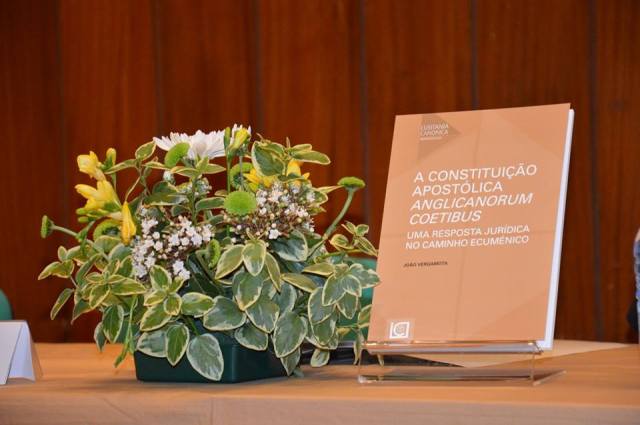 Mgr Newton was invited to attend the launch of the book at the Catholic University of Lisbon, along with around 100 guests including the Papal Nuncio for Portugal and the former Rector of the Catholic University of Lisbon, Prof. Braga de Cruz. (NEW: By clicking here you can access Fr. Vergamota’s thesis presentation notes in English.)
Mgr Newton was invited to attend the launch of the book at the Catholic University of Lisbon, along with around 100 guests including the Papal Nuncio for Portugal and the former Rector of the Catholic University of Lisbon, Prof. Braga de Cruz. (NEW: By clicking here you can access Fr. Vergamota’s thesis presentation notes in English.)
Pictured with Mgr. Newton on the platform are Fr Vergamota (left) and his supervisor, Fr João Seabra.
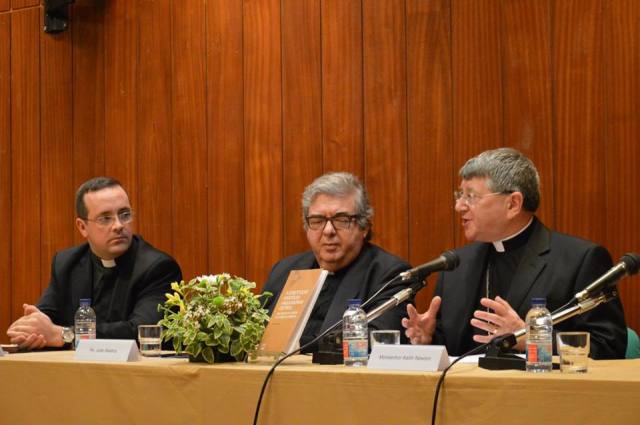
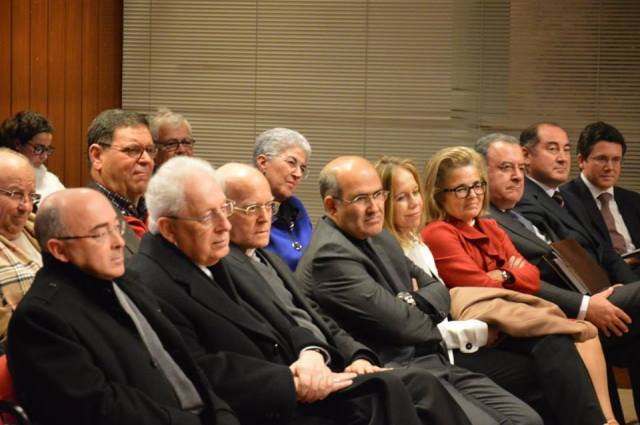 *João Vergamota: A Constituição Apostólica Anglicanorum Coetibus – uma Resposta Jurídica no Caminho Ecuménico is published by Universidade Católica Editora, Lisbon, at a price of € 11 (ISBN: 9789725404942).
*João Vergamota: A Constituição Apostólica Anglicanorum Coetibus – uma Resposta Jurídica no Caminho Ecuménico is published by Universidade Católica Editora, Lisbon, at a price of € 11 (ISBN: 9789725404942).
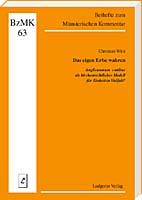 P.S. Another of our Ordinariate Expats friends, Fr. Christian Wirz, Officialis of the Diocese of Hildesheim in Germany, has also published his licentiate thesis as a book. It is called “Das eigene Erbe wahren – Anglicanorum coetibus als kirchenrechtliches Modell für Einheit in Vielfalt?” (Preserving their own Patrimony – Anglicanorum coetibus as a canonical model for Unity in Diversity?) and costs € 36 (ISBN: 978-3-87497-276-5). The publishing house is Wingen Verlag, Essen.
P.S. Another of our Ordinariate Expats friends, Fr. Christian Wirz, Officialis of the Diocese of Hildesheim in Germany, has also published his licentiate thesis as a book. It is called “Das eigene Erbe wahren – Anglicanorum coetibus als kirchenrechtliches Modell für Einheit in Vielfalt?” (Preserving their own Patrimony – Anglicanorum coetibus as a canonical model for Unity in Diversity?) and costs € 36 (ISBN: 978-3-87497-276-5). The publishing house is Wingen Verlag, Essen.




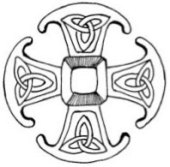
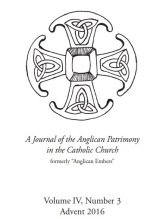

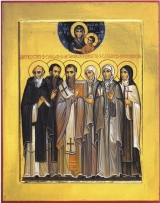



Your Portuguese may not be up to a review of Fr Vergamota’s book, but I hope you will let us know what answer Fr Wirz gives to the question in his title. It is a question that has frequently been touched on at this blog.
I will do better than that and try to provide BOTH:
First a comment by Fr Vergamota on his thesis:
In 2011, when I started to study Canon Law, of course my plan was to stress the link between theology and canon law. As Saint John Paul II said, the Code of Canon Law of 1983 is the last document of the Second Vatican Council, because it translates into juridical language all the ecclesiology of the Council. And of course, as we know, one of the most important tasks of Vatican II’s ecclesiology was ecumenism and Church Unity.
But this desire to heal the injuries in Christ’s body is not new. For example, we have the Council of Florence (15th Century) and the concepts of unio et pax as an ecumenical solution to the relations with Oriental Churches not in full communion with Rome. This council wanted to define those things that were dogmatic, to distinguish them from those aspects which could legitimately be understood from a different angle. From a dogmatic point of view the most important was unio, and as regards discipline (i.e. that which is not directly from divine law) the most important was pax.
It was when I studied this chapter of Church history that I thought of the subject for my final licentiate in Canon Law and that my interest in the Ordinariates began. I wanted to link ecclesiology, ecumenism and the canons: to this end there was nothing better than the study of the Apostolic Constitution Anglicanorum Coetibus of Benedict XVI (2009) establishing the Ordinariates for groups of Anglicans who want to be in full communion with the Catholic Church and preserve some aspects of Anglican patrimony. I wanted to understand and see how this pontifical initiative is a juridical answer in the light of the ecumenism of the Second Vatican Council, upgrading the concepts of the Council of Florence, of unio in dogmatic matters and pax in those that concern discipline, creating in this way a solution which goes further along the path of Church Unity. I wanted also to deepen my understanding of the reasons and principles that inspired Pope Benedict to take this initiative.
All this led me to write my final thesis with the title: The Apostolic Constitution Anglicanorum Coetibus, a juridical answer in the way of ecumenism. I presented the thesis (and the final exam) on 1st August 2014.
And secondly a review of Fr Wirz’s book by Thomas Green:
Das eigene Erbe wahren. Anglicanorum coetibus als kirchenrechtliches Modell für Einheit in Vielfalt? by Christian Wirz (review)
Thomas J. Green
From: The Jurist: Studies in Church Law and Ministry
Volume 73, Number 2, 2013
pp. 683-685 | 10.1353/jur.2013.0041
In lieu of an abstract, here is a brief excerpt of the content:
A notable recent event in Catholic-Anglican relationships was the promulgation in November 2009 of the apostolic constitution Anglicanorum coetibus (AC) by Benedict XVI specifying conditions for the corporate reception into the Church of Anglicans desirous of full catholic communion while seeking to preserve their distinctive Anglican patrimony. A series of Complementary Norms issued by the Congregation for the Doctrine of the Faith accompanied the constitution to facilitate its implementation. While there is somewhat extensive secondary literature on various aspects of the two documents, no author seems to have explored in any depth the questions addressed in this work by Christian Wirz. Can the apostolic constitution possibly serve as a canonical model to realize the basic theological-canonical value of unity in diversity in an increasingly world Church? The author of this extensive licentiate thesis in canon law is a priest of the Diocese of Hildesheim, Germany, who pursued theological studies in Frankfurt and Rome and canonical studies in Münster.
After a brief introduction to the interrelated themes of the work, Wirz raises the basic question whether AC is a possible response to the question of institutionalizing the values of ecclesial unity in diversity and providing appropriate pastoral care for different ecclesial groups for whom traditional territorial structures may not be especially appropriate. The first part of Wirz’s work briefly comments on the history of Catholic-Anglican relationships from the Reformation up to the promulgation of AC. It then examines both the constitution and the Complementary Norms in some detail.
A second part of the thesis addresses various questions about the concrete legal profile of the personal ordinariate, the basic structure at the heart of this new canonical arrangement. Within the broader context of the ecumenical world, it considers how such a structure serves the values of fostering unity with the Catholic communion while preserving integral elements of the Anglican spiritual heritage. Key issues that are explored are the relationship of the ordinariate structure to territorial dioceses and the former’s permanent or transitional character.
The third part of the work assesses prospects and problems of structuring personal as distinct from the predominantly territorial circumscriptions that underlie Latin Church governance patterns. Initially the author explores in some depth the discussions at Vatican II and during the Latin code drafting process which led to the formulation of canon 372, 2 on the structuring of personal particular churches. Wirz concludes this part with some thoughtful theological-canonical comments on the relationship of the territorial and personal principles and their impact on church structures. But before he does so, he examines several different types of personal ecclesial circumscriptions: the Military Ordinariate, special Latin ordinariates designed to provide for the spiritual care of Eastern Catholics in the diaspora who do not have access to their own hierarchy, the personal Apostolic Administration of Campos, Brazil designed to meet the spiritual needs of a certain group of traditionalist Catholics who at one time had been affiliated with Archbishop Lefebvre, and finally personal prelatures with due regard for questions that can be posed about their proper constitutional status vis-à-vis the aforementioned structures.
A somewhat brief concluding part compares AC with the aforementioned personal ecclesial circumscriptions, analyzes similarities and differences among them, and judges that there is a uniqueness about AC that raises serious questions about whether it is indeed a workable canonical model that may be replicated in other ecclesial settings characterized by significant institutional diversity. Personal ordinariates as envisioned by AC can enable groups of Christians to move beyond their limited degree of communion with the Catholic Church and enter into full Catholic communion. And what is especially important, they are enabled to bring various elements of healing and truth which until now have been outside the Church into a lasting home within it (LG 8).
The work concludes with a series of appendices containing primary sources pertinent to AC, a list of abbreviations of primary sources discussed in the thesis, a list of key primary sources, a fairly thorough bibliography of secondary sources, and a list of ecclesial websites where one can pursue further information about the various institutional entities discussed in the work.
This work is characterized by careful research, thoughtful…
David,
This is a very important work. It’s unfortunate that it is not accessible to the majority of clergy and members of the ordinariates due to the linguistic barrier.
Perhaps the Anglicanorum Coetibus Society can work with the author to facilitate the preparation and publication of an English translation. It would find a home on my bookshelf!
Norm.